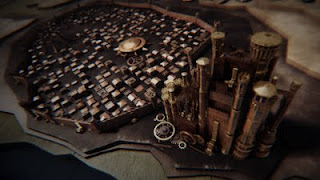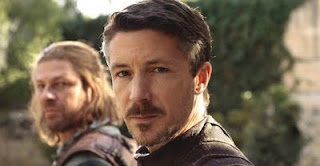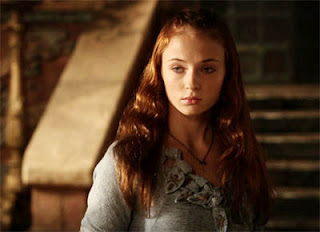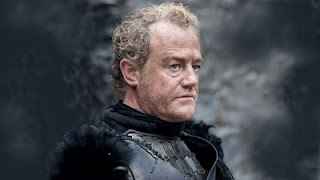Reviewer Kieran Mathers, who recently undertook an epic quest of his own when he relocated from Cardiff to Geneva (he now lives within sight of the CERN Large Hadron Collider and will be first into the black hole when things go wrong), returns to give us his assessment of the ongoing saga of Westeros. New to Game of Thrones? Check out our primer!
The opening credits in a Game of Thrones have confused me for a while. Putting geographical exposition within your credit sequence is a great idea, because it removes the need for Kurusawa-esque moments of map-based talking, complete with moving hands.
But what exactly is it about? It looks like a wargaming board, which makes sense when you consider the show’s title, but why is it coming to life using clockwork mechanisms? I know it looks good but it doesn’t make sense considering the level of technology we’ve seen in the show. Something simpler, like a stone chess board, might have been more in keeping with what we’ve already seen of Westeros.
Also, at the end of the sequence, the world curves the wrong way. When we arrive at Vaes Dothrak, city of the Horse Lords, we look back towards Westeros which is now higher in the horizon, curved above us. Does that mean this world is, in fact a Dyson Sphere?
But I digress. On to Episode Four, named after the people within it:
Tyrion Lannister (Peter Dinklage) returns to Winterfell on his way home from the Wall and has been able to design a saddle which will allow Bran to ride, if not walk. It’s an unexpected moment of kindness, especially when you consider the reception he receives. Once again, the writing is careful to indicate how little each character knows of what is going on; Tyrion does not know he is suspected of murder at this point. We, the omnipotent audience, understand this but it allows characters to make mistakes that sometimes seem foolish.
And our omnipotence is secured by the massive amounts of exposition – fully the first third of the episode is given over to characters telling each other what we already know and the pacing takes a real dive.
I commented in the previous review that it was great to see the characters start to breath, longer scenes allowing more naturalism in. This should have come with the caveat ‘… within reason’. There is a scene early on between Viserys and the pleasure slave he has hired for his sister, which probably runs about six minutes and, while as brilliantly acted as you would expect in a show where even bit-part actors bring their best to the table, it serves no purpose other than to give us more detail about dragons. It could have been half the length or dropped altogether.
This is followed by a scene between Sansa Stark and Septa Mordane which lacks any dramatic punch. We already know Sansa does not get on with her father, but this is re-stated. All we get is a little more detail into Sansa’s fears about not giving Joffrey (her betrothed) a male heir. This could easily have been a little part of another scene.
Thankfully, things pick up again as Eddard Stark continues to investigate the death of Jon Arryn. The exposition, while still thick, is much better laced into the action and the mystery succeeds in binding together the show’s disparate elements. It’s also good to see the introduction of Gendry – one of King Roberts (Mark Addy) bastard children. Like all of the children in this show, he’s been aged a serious number of years as well, probably the most of any of the younger characters. The scene in which Littlefinger explains the political realities of life in the Red Keep was a highlight, especially with its close ups and commentary from Littlefinger regarding the dangers of trust in their environment.
However, the jousting at the Hands Tournament was a disappointment. I know how expensive it must be, but jousts were rapid fire affairs with hundreds of knights tilting at each other. The scene lacked physicality and drama: even the tragic end could not redeem it.
Across the sea, Daenerys is beginning to move out of her brother’s shadow, physically fighting him for the first time. Emilia Clarke’s warrior princess has the toughest arc to follow, as readers of the book will know, and it’s good to see that this feels totally unforced as Dani begins to find her feet amongst the Dothraki and be their queen. She also comes to the realisation that her brother is neither the man she thinks he is nor the man she needs him to be. It is the fundamental realisation of the strength of the abused, and it was played very well indeed.
On the Wall, we have the introduction of Samwell Tarly (John Bradley-West), the fat self-confessed coward. I was surprised at the relatively late introduction of Sam, but it’s good to see that it gives Kit Harington more to act with. Jon’s defence of Sam springs both from a sense of mercy and because he knows what it is to be an outcast. Though it’s not really made too clear in the show, both Sam and Jon could be heirs to great nobility, but neither was wanted. Despite their obvious differences, it’s great to see that this basis for their relationship is intact, and that their scenes are both natural and believable. It’s also good to see Jon Snow have a little humour, because at certain times this episode has been rather po-faced.
That said, their later scene in the mess-hall did not ring true for me. I understand Jon is supposed to be respectable and forward thinking, ashamed of his bastardry, but how old was he when he met Ros? He’s not more than twenty and I found it unrealistic that he would demonstrate such self-control as a young man or tell anyone about the missed opportunity.
It’s worth mentioning Alliser Thorne at this point, played by Owen Teale. He’s been a constant bullying influence in the scenes at the Watch, picking on Jon for a reason yet to be explained. It gives me great pleasure to see British actors using northern accents in an American television show as there is actually very little reason to do so. Westeros is Westeros, not medieval England and they could have used whatever accent they wanted. For those that do not know, the difference is that a southern English accent makes “bastard” sound a bit like “barstool”, while the hard a’s of the north allow you to spit the insult much more effectively. Teale should be praised for keeping his accent and for just being an evil bastard. So many of the characters are layered and nuanced, it’s great to occasionally have someone you can just hate on principal. Especially when he confesses to cannibalism.
So, the first knight has fallen and it doesn’t look like they’re about to stop …





